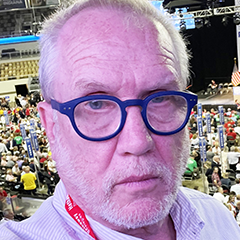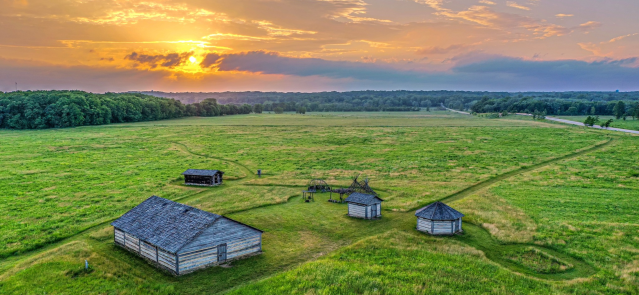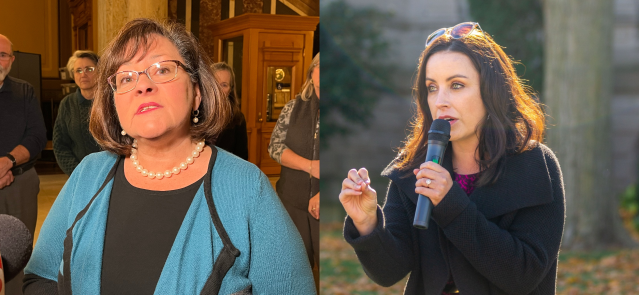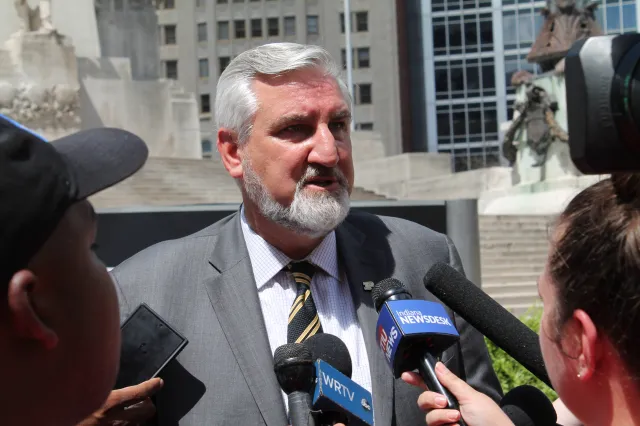Stay ahead of the curve as a political insider with deep policy analysis, daily briefings and policy-shaping tools.
Request a Demo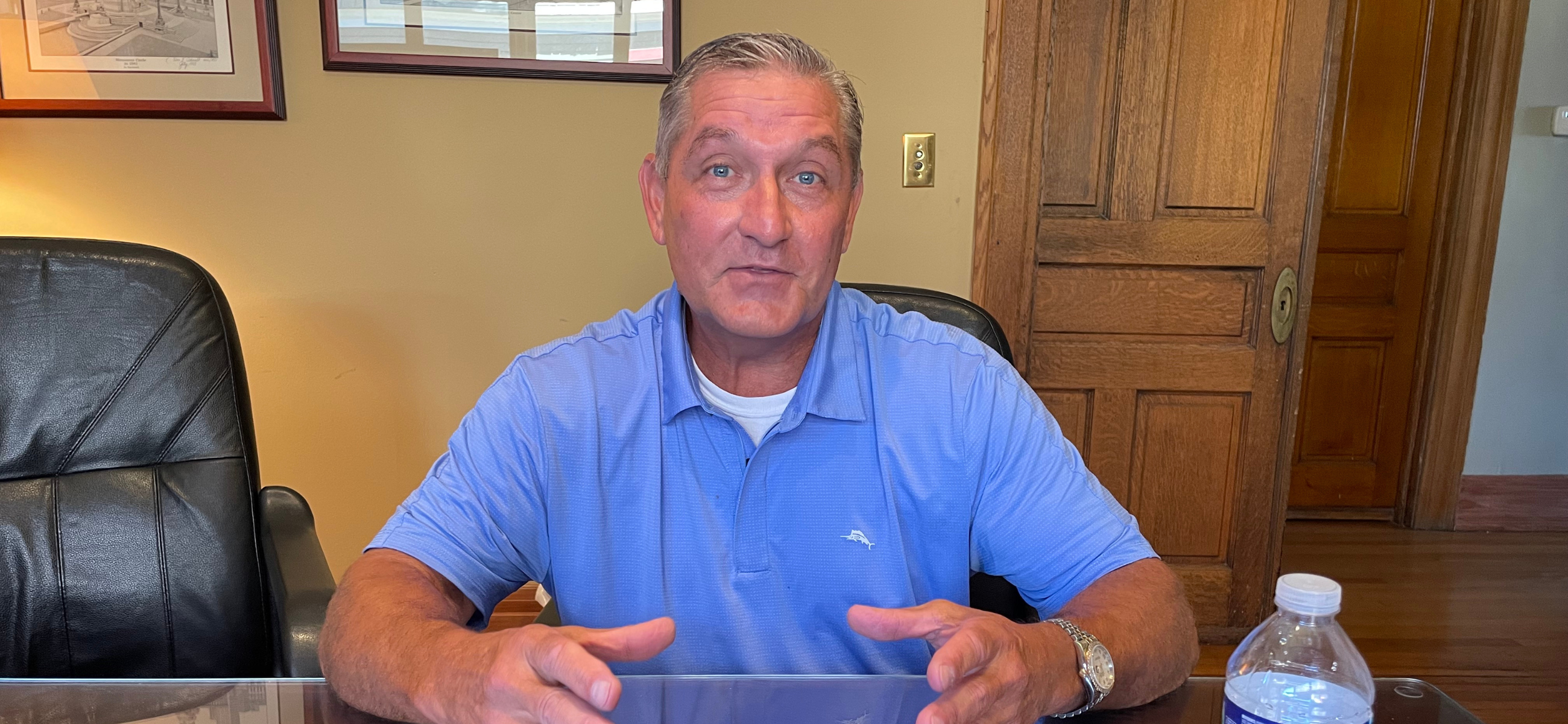
Terry Goodin at McCormick campaign headquarters. (Credit: Brian Howey)
- Cattleman seeks to join McCormick ticket
- Goodin: Indiana does better by creating better educational opportunities
- Democrats can win with better message, better candidates, Goodin says
Terry Goodin is a Hoosier cattleman. He’s also a school superintendent who served 20 years in the Indiana House. And he’s a Democrat, a vanishing rural breed.
“If you plucked somebody out of Indiana at random and said, ‘Here’s what a Hoosier is,’ you’d pluck Terry Goodin,” Goodin said about why he joined the Jennifer McCormick gubernatorial ticket last week.
Over the next five months, Goodin will be compared to Republican lieutenant governor nominee Micah Beckwith, who won a dramatic convention floor fight earlier this month and who describes himself as a “Christian nationalist.”
Goodin, who resigned last week after serving more than two years as state director for the U.S. Department of Agriculture’s Rural Development, also calls himself a “man of faith,” but he remembers what his preacher grandfather used to tell him:
“He says, ‘Terry, when you go through life, one thing you want to be aware of is beware of those folks who wear their religion on their sleeve rather than in their heart.’”
Goodin plans to differentiate himself from Beckwith on rural policy issues.
“If we’re going to look at qualifications, I’m going to hand you my résumé,” he said. “I’m the only person in this race that has experience in the rural area. I’m a farmer, I grew up on a farm, I know farmers, I know what it takes to succeed on a farm. I’m also an individual who has worked two years at USDA and my main task in that role was rural development and rural housing.”
Goodin, 57, is a conservative Democrat now running with a former Republican. He didn’t vote for a bill establishing same-sex marriage in 2011. He wasn’t present for a House joint resolution vote on same-sex marriage several years later due to a family member’s medical emergency.
In a June 20 interview at the McCormick campaign headquarters, Goodin said his 2011 vote was a mistake. “I’m not going to come up with any excuses at all,” he said. “I’m a life-long learner. As we go through our lives we learn from situations, we gather experiences. It either changes our opinion or it makes us more firm in our beliefs. As I grew and I talked with more folks, and I literally reached out to more folks about the topic, I realized I was wrong.”
Goodin had a 100% rating from the National Rifle Association in 2020 and received an A+ grade from the NRA PAC in 2010. He received a 20% rating in 2013 from the American Conservative Union-Indiana and a 100% rating from the AFL-CIO in 2014. He briefly served as House minority leader following Rep. Scott Pelath’s resignation in 2017. His Indiana House career came to an end when Republican Zach Payne defeated him 56% to 44% in 2020.
Goodin says he’s had a productive conversation with state Sen. J.D. Ford, who was alarmed enough by Goodin’s lieutenant governor candidacy that he approached McCormick about it the day before it was announced. The gay Carmel Democrat had floated the idea of challenging Goodin at the July state Democratic convention before confirming to State Affairs on Wednesday that he wouldn’t run.
“I think he [Ford] understands where I am coming from,” Goodin said. “He understands politics. He understands how things change. He understands that as long as people are sincere, they can change. I think he really understands that I’m sincere.”
As far as how a McCormick/Goodin ticket wins in November to derail the 20-year GOP gubernatorial dynasty, Goodin said, “Quite frankly, we win because we’ve got a better message. We’ve got better candidates. As we move forward, when we get out and about and start talking to people in these communities, they’ll realize that Indiana can do better.”
Here’s our interview with Terry Goodin. It has been edited for clarity and brevity.
Q. Walk us through how this process began for you.
A. I always pay attention and am aware of what’s going on. I was working on the farm and got a phone call out of the blue, and it was a representative from the McCormick campaign: “Would you be interested in being [McCormick’s] lieutenant governor candidate?” First off, why would I do this? I’m in a good spot, I’ve got a great opportunity and I have a lot of things going on. But then what I realized was this: I’m not a career politician. And as I was traveling around the state of Indiana, I noticed that it’s broken, especially in rural areas. There has got to be a fix. On the farm if you’ve got something that’s broken, you’ve gotta fix it. So the farmer is coming out of me, man. The state of Indiana is broken and we need to fix it.
Q. How is the state of Indiana broken?
A. As you travel around the rural counties and rural towns, you’ll see that they’re almost all going out of business. The reports we get on the population trends, you see that. Only eight were gaining. There’s a reason those rural communities are losing population, and it’s called opportunity. The state of Indiana has turned its back on rural communities. It kind of pulled the rug out for opportunity in those rural communities. It really hinges on one of the most important issues, which is education. We have politicos running around here wanting to talk about economic development. Then they want to talk about education, then jobs. They want to talk about all these different scenarios in different silos. You can’t separate those. You can’t have great-paying jobs without a good education. So we’ve got to make that conversation on good education and good jobs and how do you get there. We’ve got to connect the puzzle on how you get there.
Q. Curt Kovener of the Crothersville Times sent me a few paragraphs about your tenure as [schools] superintendent in that town. What kind of innovative programs did you create and how did they dovetail into the needs of your rural community?
A. I had great partners in our school corporation, school boards and folks who wanted to see their children get ahead. What I tried to do is as I traveled the state and talked about issues as a legislator, I could see where there were shortcomings in our education system. I was one of the unique people who had the opportunity to actually listen and then go back and implement that. We created world-class vocational and technical skills where kids could walk out of high school and they could go get a job anywhere they wanted. On the flip side of that, we did an early college program where — it was unheard of — kids were graduating from college from high school. The way it all works out, the college schedule is somewhat shorter than the K-12 schedule, so these kids were actually graduating with a college diploma before they received their high school diploma. What we did with those kids is we always made sure when they left they had a certification or they had a degree because here’s why: As we go through college, we know we take courses that go over five years or seven years. Courses don’t follow you through life, but degrees do, certifications do. So that’s why we made sure this child has got a certification because, guess what? When they got out and after three or four years and they didn’t want to do that job, they could transition into another job because they’ve got a certification or a degree to be competitive in the job market. … I think we’re really falling short in the education arena in Indiana, and it’s not that the current folks are not doing a good job. I’m not criticizing anybody in this, but what we’ve got to do is we can do better. We do better by creating better educational opportunities. That creates better job opportunities. Better job opportunities create better pay. And that’s what we’re gonna be in Indiana.
Q. What will your and Jennifer McCormick’s message on education be over the next five months?
A. On the education front in Indiana, we can do better. We can’t pick winners and losers. We can’t leave people out. They talk about the rural schools and how rural Indiana is dying. A big part of that trouble in rural Indiana is because the state of Indiana is not funding those rural schools properly. If you’re not getting proper funding in those rural schools, it really cuts back on what you can offer kids. Well, if you say, “We can’t offer this program or that program” at the school, these parents get up and leave and go somewhere else. We want kids to be able to live in a community and go to their school and be able to get any kind of education they want to get. They want it to be a world-class education. They shouldn’t have to come to Indianapolis or go to a charter school to get that education. You should be able to get that education anywhere.
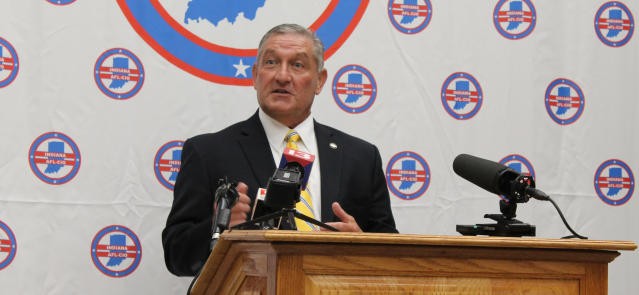
Q. A decade ago, Scott County, your home county, became the epicenter of an HIV outbreak, spread through the use of syringes and needles. How is that related to education in rural Indiana?
A. ’ve seen research and it does relate to that. I’ve got a brother [Jerry Goodin] who is sheriff of Scott County, and as a state, we’ve got to start working on recovery programs. What a lot of people don’t realize is they think incarceration, breaking the law, they think when they’re growing up, only happens in the cities. But there are a lot of rural families who have kids, family members in jail because of an addiction. How do we intercede in that? How do we fix the addiction so we don’t have those kids incarcerated?
Q. I’m sure Sheriff Jerry Goodin is facing what 91 other Indiana sheriffs are, which is their jails are also addiction recovery centers.
A. It has. I can’t speak for him, but I speak to him. He’s saying a lot of these folks come to his jail because they’ve never had hope, never had anyone lift them up. All it takes is to give somebody a little bit of hope and a little bit of help and let them know you’re going to stumble, you’re going to fall. That’s OK. That’s part of being human. You’re going to be able to grow in this as long as you’re making progress in life — that’s what this is all about. [Sheriff Goodin] has received Department of Correction awards for his recovery programs. We need to focus on that. We need to sit down and look at that as a state. What is successful right now? And what is not? We can do a lot of learning as a state as to what’s successful in these small rural counties.
Q. In 2008, Jill Long Thompson was the Democratic gubernatorial nominee, and one of the main planks in her campaign was that no community would be abandoned. But you and I know Indiana is littered with towns that didn’t make it. Is it possible to save every rural community? Or is it incentivizing communities that are progressive enough to do what it takes to survive?
A. You’re correct. There are going to have to be people in those communities that are going to have to step up. As you and I both know, you can’t save a small town — the small town has to save itself. But guess what? We can be their partner. We need to identify those communities that do need help and put together a process to be more understanding of what the Office of Community and Rural Affairs can do. We need to go on steroids with OCRA. These communities have so much to offer — that slow pace of life that a lot of people are looking for right now to raise their families. There is no reason they should be going the opposite way when they should be going forward.
Q. You’re a farmer. Tell us about your spread.
A. I raise beef cattle. We’ve been cattle farmers for as long as there’s been Goodins in America. I love beef cattle. One good thing about beef cattle is …
Q. It’s what’s for dinner!
A. It’s what’s for dinner — that’s exactly right. It’s a great occupation. I get pleasure knowing I’m helping feed the world. When farmers say that, they really mean that. What a lot of folks don’t realize about rural America is this: We feed the nation, we fuel the nation and we clothe the nation. Your ethanol, all of your fueling products, now have some kind of grain content in them. The clothing you’re wearing has some kind of agricultural product in them. And that’s where our food comes from. What I want to do is not just make rural Indiana the ag center of the world; I want to make Indiana the ag center of the world because there are huge opportunities right now with urban farming. Indiana is really missing the boat on some of those opportunities.
Q. Let’s talk about the Indiana Democratic Party. You entered the General Assembly in 2000. In those days, the county courthouses along the Ohio and Wabash rivers were filled with Democrats. Voters in the 8th and 9th Congressional districts would vote for Reagan or Bush for president but Lee Hamilton and Baron Hill for Congress, and they elected local Democrats. You watched that in real time disintegrate to the point that you were one of the last rural Democrats in the General Assembly. That all changed in, what, 2010 with the Tea Party movement? And what path should the Democratic Party take for revival?
A. I wish I had all the answers to that. I’m not a politically minded person. What I want to do is this: I want people to understand that radicalism doesn’t work. We’ve got to stay moderate and true to our values. As we move forward, we’ve got to make sure we stay in the middle, we stay on common ground. If you plucked somebody out of Indiana at random and said, “Here’s what a Hoosier is,” you’d pluck Terry Goodin. That’s what we’ve got to do. We’ve got to let people know that the Democrats represent all of Indiana, we’re gonna move forward and we’ve got a cause we’re gonna fight. It’s the people — that’s our cause. We’re gonna do everything we can to ensure that people succeed.
Q. I’ve asked every gubernatorial candidate, from Jennifer McCormick to Mike Braun, this: How do you win in November?
A. Quite frankly, we win because we’ve got a better message. We’ve got better candidates. As we move forward, when we get out and about and start talking to people in these communities, they’ll realize that Indiana can do better. Right now they don’t have that option because of supermajorities, and the governor’s office is also Republican. So the only thing that people know is what they’re being fed. We’ve got to let them know there’s another whole world out there and a debate that the state of Indiana is missing out on. Jennifer McCormick and Terry Goodin can deliver that. We can be prosperous.
Q. The Jamey Noel scandal is growing, and it has ensnared public servants in Clark County as well as Scott County. What do voters in November need to know about this scandal?
A. People in southern Indiana are absolutely disgusted by it.
Q. The scope of it, measured in millions of dollars, is stunning.
A. Millions. I’m sure that’s all going to come out. Of course it’s going to go to trial and everyone has due justice. As we move forward with that, what we have is what Jennifer McCormick and Terry Goodin have to offer: They can trust their elected leaders again. What Jamey Noel did is he didn’t just deface Jamey Noel; he defaced all of those folks who are public servants. Unfortunately, a lot of people use the same brush to paint politicians. He literally has crushed the confidence of all kinds of people. What we can do is people will look at Terry Goodin and they can hear what Terry Goodin says and know I’m telling the truth.
Q. Are you going to be carrying that message, particularly in the Louisville TV market?
A. Yeah. Absolutely. I’m not in charge of the media side of our campaign, but I guarantee this: Everyone in southern Indiana will know there is an option on the Indiana ticket for governor and lieutenant governor that is going to be an option of success for our state.
Q. Let’s talk about your opponent, Micah Beckwith. How will you contrast yourself with the Republican nominee?
A. There is no similarity between Micah Beckwith and Terry Goodin when it comes to the lieutenant governor position. Terry Goodin checks all of the boxes …
Q. Which are?
A. Agriculture, jobs, education, human rights, individual rights and personal freedom. Terry Goodin says every person in this world is worthy and has the same respect and the same rights as everybody else. I looked the whole world in the eye on Thursday and told them: “I made a mistake. I was wrong. I voted the wrong way and I want to make it right.” Micah Beckwith still thinks he’s right. What he is, is a radical. People in Indiana, we’re pragmatic. Farmers are known to be practical and pragmatic. That’s Indiana. Micah Beckwith is not pragmatic. He’s a radical. He spouts his mouth off and, really, more than anything, he’s a diva. He wants to be at the center of attention. He doesn’t care about anybody else. That showed at the Republican Convention when he said, “Damn the torpedoes, I’m Micah Beckwith. Vote for me.” He has zero respect for what Mike Braun says. Here’s the way I feel about it: If he has zero respect for what Mike Braun says, then he will have zero respect for what any of us in Indiana say, including voters. He’s going to do what he wants to do and doesn’t care what anybody else thinks or says.
Q. You and Jennifer McCormick have similar backgrounds, both school superintendents in small-town or rural districts. How will you interface with her?
A. When you’re a superintendent in a small school district, you have to figure out resources. When you hold the hammer, you’ve got to make sure that nail goes twice as far as someone who has a lot more resources. As a superintendent, I used it and brought that philosophy to the Legislature. We had that rural caucus and we always had state leaders come in to talk about rural development: “We’ve got to have rural development. We’ve got to get jobs to those rural areas.” I finally got fed up and said, “Hey, listen, I’m not bashing you at all and, yes, we’ve got to have rural development. How in the world can you come in here and talk about rural development without talking in the same sentence about broadband and high-speed internet? It’s gonna take you forever to build a house without a hammer. It will be impossible to get development in these rural areas without high-speed internet.” So one of my main focuses at the USDA was to push out high-speed internet in all our rural areas. It’s a complete failure in our state to say that there are still places in our great state that still have dial-up internet. That’s uncalled for. It’s 2024..
Q. The Holcomb/Crouch administration has increased broadband in many areas with funds from …
A. The Biden administration. I know right now Joe Biden is not a popular president. We get that. We understand. We have to look at the positive aspect; we can’t just focus on the negative. What I’m looking at is if you’re a leader in a state that’s going to get resources, take those resources and use them to the best of your ability to help your people succeed. I know the USDA partnered with OCRA. Denny Spinner was there. Denny and I are great friends and we had a great partnership. I know the Department of Commerce is working on access to high-speed internet across Indiana. Gov. Eric Holcomb is working to finally, legitimately get it out the door. But guess where the money is coming from? The Biden administration. If you don’t put your money where your mouth is, it’s all talk. The Biden administration has put their money where their mouth is.
Q. Biden vs. Donald Trump. What’s at stake?
A. It’s scary to me to know there is an individual who is so narcissistic. He scares me. He doesn’t have the true interest of America in his playbook. His playbook says, “The Greatness of Donald Trump”and “How can Donald Trump succeed?” not how America succeeds..
Q. Is that message playing in Scott County?
A. We know that Donald Trump is popular in Indiana. No one will deny that. What we’ll focus on is Jennifer McCormick and Terry Goodin in the governor’s race. We’ll tell people, “Hey, you have a choice in Indiana. Even if you want to vote for Donald Trump for president, that’s your choice. You can vote for whoever you want for president. But when it comes to the governor of Indiana, vote for McCormick and Goodin because we’re gonna make Indiana a better place to live, work and raise a family.”
Q. You came of age politically when Evan Bayh and Frank O’Bannon revived the Indiana Democratic Party. It’s fallen below where it was in the early 1980s. What’s your message to rural Hoosiers?
A. Somehow, some way the Republican Party has hijacked farmers and rural America. We’ve got to let them know that it’s the Democratic Party that stands behind farmers. We’re the ones who think you should be able to earn a living wage. We’re the ones who think we should do away with personal property taxes you have to pay on your 20-year-old tractor every year. I don’t think anyone can argue that under this current legislative control — that’s gone on for two decades — that property taxes are the highest they’ve ever been. All you gotta do is take a look at your tax bill. Democrats are the ones who believe in families, and for families to be successful, they have to be emotionally stable and successful and they have to be financially stable and successful. The Democratic Party knows that, and the Republican Party does not. We’re not just focusing on silos. Right now there are unequal educational opportunities in Indiana, and we’ve got to figure out a way to get that field level again. That is the most important aspect moving forward for our children. We all know that education is the largest rung on that social platform. We know that.
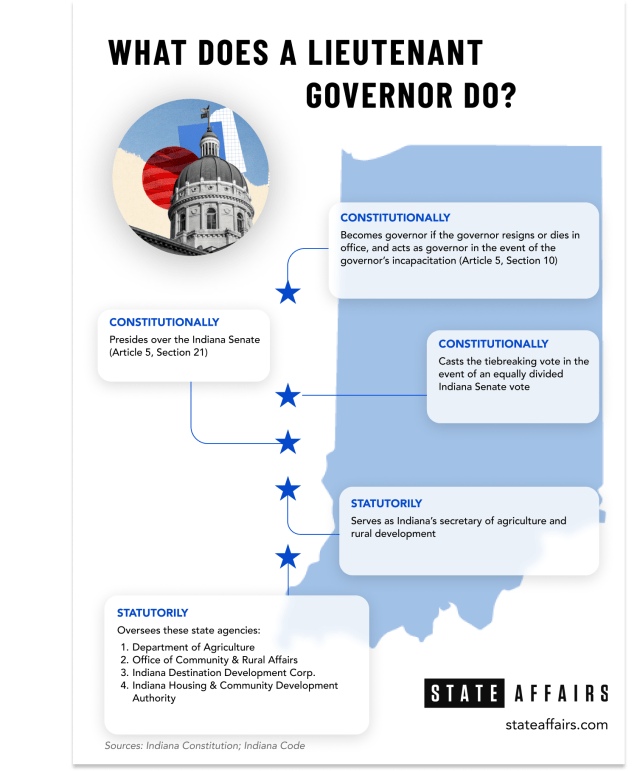
Brian A. Howey is senior writer and columnist for Howey Politics Indiana/State Affairs. Find Howey on Facebook and X @hwypol.
Know the most important news affecting Indiana
Get our free weekly newsletter that covers government, policy and politics that impact your everyday life—in 5 minutes or less.
Six things to know about the Fourth of July holiday in Indiana
Barbecue, fireworks and the outdoors are all on the menu for the Fourth of July holiday in Indiana, but it won’t be a good time to visit the Bureau of Motor Vehicles or mail an important package. State and federal agencies will be observing the holiday along with the rest of us, but many of …
Democrats to select attorney general candidate at upcoming convention
Indiana Democratic Party delegates will choose between two candidates for the party’s attorney general nomination at their July 13 convention. Destiny Wells, a defense attorney and U.S. Army Reserve officer who ran unsuccessfully for Indiana secretary of state in 2022, and Beth White, former Marion County clerk and president of the Indiana Coalition to End …
With Indiana ban in place, thousands seek abortions in neighboring states
After a traumatic first pregnancy that culminated in a hospital stay for both herself and her twin daughters in 2013, Sarah did not intend to have more children. She took precautions. They weren’t enough. Sarah, whose name State Affairs has changed to protect her identity, learned of her second pregnancy after she became ill in …
Holcomb’s stance on marijuana unchanged ahead of expected reclassification
Gov. Eric Holcomb on Thursday said his stance on marijuana had not changed ahead of the drug’s expected reclassification. Indiana is among 12 states that have not legalized marijuana for medical or recreational use. Neighboring Illinois, Michigan and Ohio are among the 24 states that have legalized recreational and medical marijuana use. Kentucky is one …
